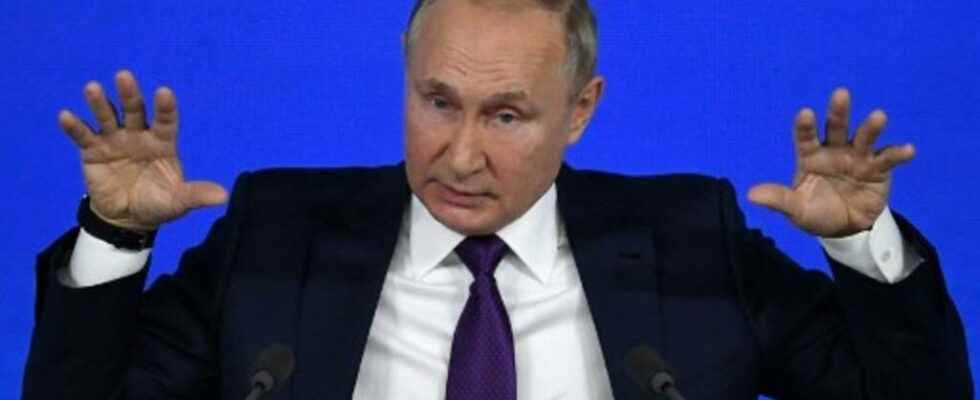” Russia is restored to its historical integrity “: this sentence is taken from an article by the RIA-Novosti press agency which was published by mistake on February 26 before being withdrawn after a few hours. The article, which was to appear only after the Russian victory in Ukraine, details the real objectives of the war: not only to ensure the security of Russia, but also to correct a ” historical error by bringing Ukraine back into its orbit. Decryption by Julien Théron, researcher at Sciences-Po Paris, specialist in conflicts and international security, and co-author with Isabelle Mandraud of the book: Putin, the strategy of disorder.
RFI: Are the objectives detailed in the RIA-Novosti article in line with Vladimir Putin’s geopolitical and historical “vision”?
Julien Theron: Absolutely, because, according to Vladimir Putin, the Ukrainian people do not exist. The Russian President himself wrote it in an article published last July: he considers that the Ukrainians do not really form a Nation, that they are Russians like the Belarusians and that it would therefore be natural for the peoples belonging to the same Nation exist in the same State. And that was even before the denial of the Ukrainian state that preceded the invasion. There is thus a kind of mythological construction, a vision of the world in which Russia would have a kind of natural right over a whole bunch of peoples. With Ukraine, we are on an almost imperial, Russian, Slavic question. But maybe tomorrow, if we take the Georgian case, we will rather talk about the legacy of the USSR because Georgia was part of the Soviet Union. Russia will then be able to play on another historical string to explain that Georgia should also be under the tutelage of Moscow. It must be understood that it is an intellectual construction more than a legal or geopolitical reality.
In this RIA-Novosti article, there is the reference to the end of the USSR, but there is also the reference to this idea of a medieval Russia whose origin is located in Kiev. And that it would take a “revenge of history” for Russia to regain this territory. How to decipher what is akin to a “telescoping” of dates and historical references in the service of this project of invasion of Ukraine?
It is of course a question of historical revisionism which makes it possible to reconstruct history according to one’s interests, so that it corresponds to contemporary ambitions. The historical question is moreover very problematic today in Russia: whether it is a question of historians who work on Stalinism or ban memorial, there is a relationship to history that is purely political. You have to understand that if every people did that in the world today, there would be an absolutely infinite amount of wars, claiming such and such a period, such and such a territory, such and such a domination over another people.
Another idea raised in this RIA-Novosti article: Russia must act quickly because there would be a sort of race against time to prevent Ukraine from slipping out of its orbit for good.
It is clear that the Belarusian and Ukrainian peoples, the three Baltic peoples, the Georgian people, in short, a certain number of peoples who were very closely linked to Russia are today in complete mistrust, not of the Russians themselves, but of the Kremlin policy. And from that point of view, in fact, there is a race against time because all these peoples clearly understand the interest they have in having guarantees of democracy, the rule of law and the rights of which are presented by the European Union and defense guarantees with NATO. So there is a real race against time and a declining influence.
► Also to listen: War in Ukraine: how far will Vladimir Putin go?
Is it possible to date this obsession of Vladimir Putin for history in general, and for the history of Russia in particular? And to explain the sources of this obsession ?
From the start of his presidential mandate, even from his arrival in the Kremlin under the wing of Boris Yeltsin, Vladimir Putin showed that he had every intention of restoring a power-politics. Consequently, he begins with the great trauma of the Russian army of the 1990s and it is through Chechnya that he will gain power in Moscow. Then, in 2007, there is the famous speech at the Munich Conference, in reaction to the American invasion of Iraq. Then, in 2008, there was the invasion of Georgia. So, we realize that it is progressive, but that this ambition exists as soon as he arrives in the Kremlin.
Do we know what echo this historical obsession of Vladimir Putin has among the Russians? ? Is there an approval of this great project as we could see in 2014 at the time of the annexation of Crimea ?
This is very difficult to assess for two reasons. First, because the Kremlin is working to transform the patriotism of the Russians – which is very strong – into an expansionist nationalism, and it is quite difficult intellectually to separate the two. The second reason is that obviously the statistics are very difficult to conduct in Russia. It is certain that Vladimir Putin has a considerable number of people who support him and also that there is a considerable number of people who oppose him, but it is very complicated to establish the proportion between the two. This proportion can also move according to both domestic policy, the socio-economic reforms that are undertaken, but also international policy. Now, precisely, the international action of the Kremlin intervenes as a means of compensating for achievements which are not very grandiose on the internal scene. And so, these questions are instrumentalized in order to maintain the power in place.
► Read also: The day Vladimir Putin said he would achieve “his goals” in Ukraine
